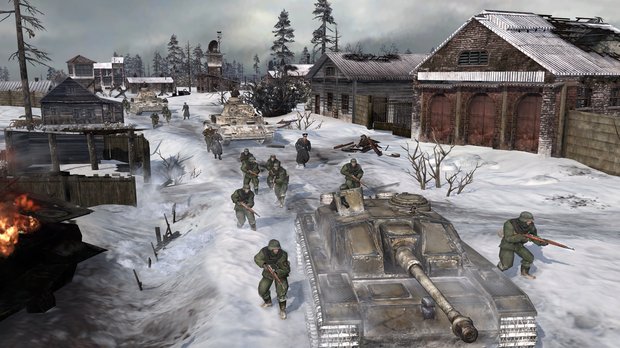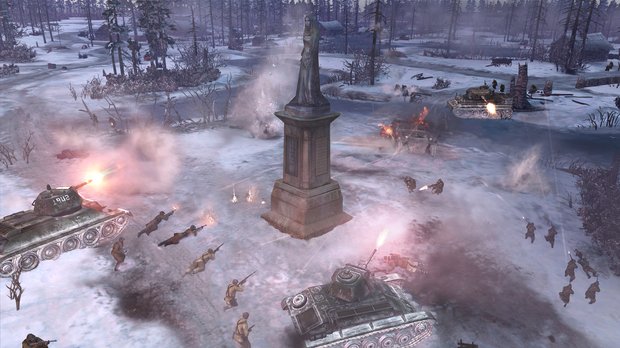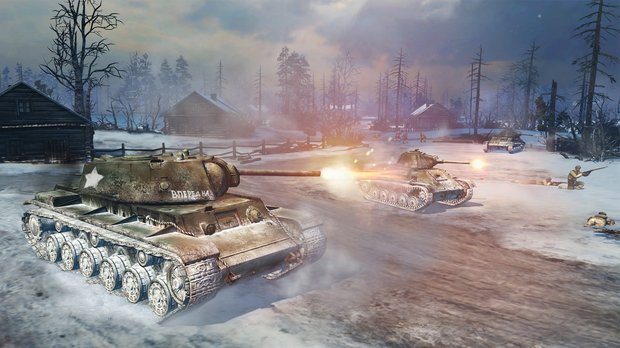Company of Heroes 2 hands-on preview War machines and wintry woes
What do you do when your soldiers are literally freezing to death?
Never before have we played an RTS where our troops could die of hypothermia. Then we got hands-on time with Company of Heroes 2. We’ve sung the praises of THQ and Relic Entertainment’s World War II strategy game in previous Company of Heroes 2 previews, but this was our first time getting down and dirty in the snow instead of watching scenarios play out from afar. And we can speak from virtual experience: War is Hell. Icy, bitterly cold Hell.
Our demo took place over two maps, one being a tutorial-style scripted map with a single squad of infantry, and the other a full-blown campaign level (which takes place between 1941 and 1945), complete with base-building and AI allies. The first map was set just outside Moscow, and demonstrated the brutality of the extreme cold mechanic. If your soldiers are unfortunate enough to be huddled up out in the frigid winter air, a little thermometer icon will indicate their rapidly dropping body temperature.

Ignore this, and your soldiers will succumb to hypothermia, dying where they stand (and they don’t turn into ice cubes like in the cartoons). To counteract the cold weather, you’ll need to recruit engineers to build fire pits on your position, or take refuge from the below-freezing temperatures in an unoccupied building. In fact, combat engineers are a huge resource to your forces – they may not output good damage, but without them there to construct base buildings or toasty fires, your entire infantry army is as good as dead.
After the straightforward “bunker down, shoot, march ahead” play of the first mission, we thought we could take on the Nazis without breaking a sweat. Not so. The second map tasked us with capturing three control points on the battlefield; the more you had under your control, the further the enemies’ counter would decrease. This was a 2v2 scenario, so we were paired up with an AI teammate who knew what they were doing. We might not have been victorious (okay, the computer completely crushed us), but we did get to see quite a few abilities and units in action.

Metal beasts like the KV-1 Heavy Tank were absolutely terrifying to encounter in the fog-of-war, though tank-vs-tank battles were far more of a fair fight. They also demonstrated the driver/gunner injury systems; if your vehicle’s under heavy fire, once of its operators might get killed inside the vehicle. If the vehicle is then abandoned, any force can rally a troop to take command of the tank, effectively converting the unit to join their side. Stumbling on a vacant tank is akin to finding a $20 bill on the ground – one that can shred through infantry with a single shell.
The most terrifying vehicle was the Katyusha Rocket Truck – if Team Rocket of Pokémon fame had access to this vehicle, Ash would be straight-up dead. This real-life long-range siege unit fires a truckload of missiles in quick succession, and could cover an area the size of a football field in devastating explosions and debris. On the other hand, the Katyusha is a sitting duck from close range; this is the kind of unit you’ll want to well away from the front lines for maximum efficiency.

We also got to see some of the commander abilities in action. Activating our IL-2 Sturmovik Attack signaled a gigantic warplane to fire on the specified position. It would then circle the area for a few seconds, raining hot lead on any units unfortunate enough to get caught in its sights. Expect the other commander abilities to be just as tide-turning, where using them at a crucial moment could spell the difference between victory and defeat.
Sign up to the GamesRadar+ Newsletter
Weekly digests, tales from the communities you love, and more
CoH2 feels like the Company of Heroes you know and love, with more strategic wrinkles - like body temperature and cracking ice - to keep you on your toes. It also won’t require a high-end PC to play; while the original CoH was rather taxing on lower-end computers, CoH 2’s new engine had been built to be much more efficient. We look forward to sharing more CoH 2 info as the game approaches its 2013 release.
Lucas Sullivan is the former US Managing Editor of GamesRadar+. Lucas spent seven years working for GR, starting as an Associate Editor in 2012 before climbing the ranks. He left us in 2019 to pursue a career path on the other side of the fence, joining 2K Games as a Global Content Manager. Lucas doesn't get to write about games like Borderlands and Mafia anymore, but he does get to help make and market them.



